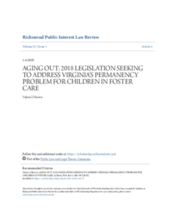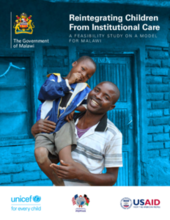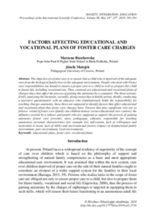Displaying 481 - 490 of 962
El presente folleto incluye información para preparar a los niños y niñas para que regresen a sus hogares o ingresen a servicios de atención basados en una familia sustituta.
The purpose of this scoping review is to assess the effectiveness of independent living programs on educational outcomes among youths aging out of the foster care system in United States.
This phenomenological study included 18 in-depth interviews with six mothers aged 19–22 years in or transitioning from foster care.
This article by staff attorney for family law and child welfare at the Virginia Poverty Law Center's Center for Family Advocacy, Valerie L’Herrou, outlines and analyses several new bills introduced by the Virginia General Assembly in 2018 and their impacts on young people aging out of the foster care system and family reintegration.
This exploratory, qualitative, multi-case study sought to understand, from the perspective of successful foster alumni college students, the role and influence of family members.
This report presents the Reintegration Model based on the implementation of a Feasibility Study that aimed to determine whether Malawi's Reintegration Framework would be effective in reintegrating children with their families or other forms of alternative family-based care for children.
The purpose of the Home Thrive Scale™ is to assess the possibility of a child staying with or returning to their family and to identify services needed to make reintegration possible.
In this study, the authors analyzed the literature on foster care in Poland and conducted a narrative questionnaire with an educator who simultaneously holds the responsibility for teaching youth in foster care autonomy in order to identify factors that affect educational and vocational plans that foster care charges have.
This working paper has reviewed cross-national datasets for the general population and available national data and other relevant (grey and academic) literature concerned with young people in care and care leavers in the three study countries.
This paper explores the leaving care policies of the Australian state of Victoria, and the reasons for policy "inaction" on providing post-care support to youth leaving care until the age of at least 21 years old.






